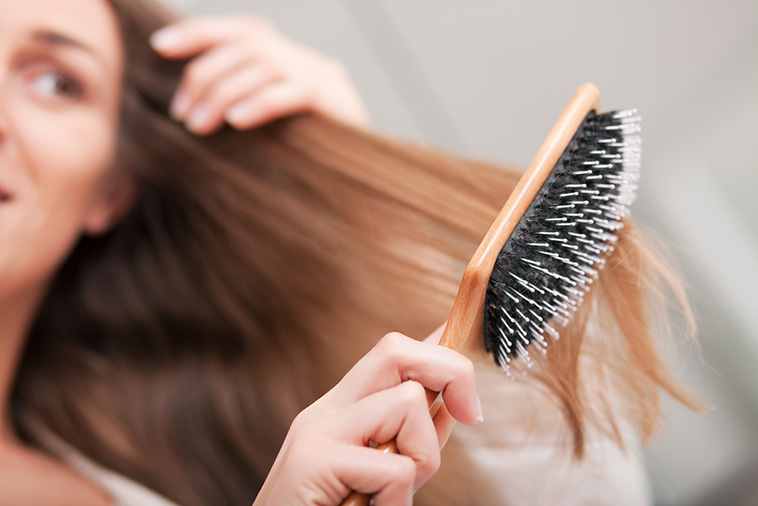
Written by Jacqueline Newson BSc (Hons) Nutritional Therapy
Isolating the cause of hair loss continues to be debated amongst the scientific community as there appear to be several factors involved. However, it’s likely that nutrient deficiencies are a big part of the problem, especially the B complex vitamins.
Slow progressive hair thinning is a common complaint, both in men and women. It is often referred to as androgenetic alopecia (AGA) and affects half of all men and women by the age of 50 years.
Hair loss can have devastating effects on self-esteem, leading to depression and lack of confidence, but is not necessarily an inevitable outcome. With a few lifestyle changes and some carefully chosen nutrients, you can look forward to strong, healthy hair.
Hair and Hair Follicles
Hair is grown from a follicle and built from cells similar to those of our skin, which is composed primarily of the protein keratin. The blood capillaries surrounding each follicle carry nourishment needed for hair-cell reproduction and growth. Hair grows in three phases known as anagen, catagen and telogen:
- Anagen – is the growth stage and can last from weeks to years.
- Catagen – the hair cells die.
- Telogen – is the resting stage which lasts for one to three months.
Only a small amount of hair follicles are lost at any one time and on average we lose around 90 scalp hairs a day.
Hair and Scalp Health
The health of the hair depends on the circulation to the root and the amount of nutrients and hormones present in the blood. Sufficient protein in the diet is also of particular importance with respect to hair strength and elasticity.
Poor nutrition and circulation will, therefore, lead to poor hair growth and condition, whereas an increase in blood flow to this area may enhance hair growth.
Causes of Hair Loss
The jury’s still out on a definitive answer for the cause of hair loss, but these are some of the contributory factors:
Nutritional Deficiencies
The scalp has a very high turnover of hair follicle cells requiring a constant supply of nutrients and energy. A lack of calories or a deficiency of proteins, vitamins, minerals and essential fatty acids can lead to hair loss and structural abnormalities.
Ageing
A follicle only has a limited number of cycles. After 40 years, hair growth slows and isn’t replaced as quickly as it is shed. This leads to thinning and for some – a degree of baldness or alopecia which occurs in both sexes, although much less dramatically amongst women.
Medical treatments and drugs
Cancer treatment that includes chemotherapy and radiation treatment influences hair loss. Side effects from some medications cause hair loss.
Poor gut health
Imbalances in gut flora, Coeliac or gluten sensitivity can affect hair health.
Physical or emotional trauma
Fevers, haemorrhage, severe illness, childbirth and stress can contribute to hair loss.
Hormonal problems
An imbalance in the androgens (male hormones) is related to hair thinning and occurs in both men and women. Poor thyroid function, as well as hormone changes, post pregnancy and during menopause, can lead to hair loss.
Other factors
Poor health, chronic illnesses, tumours and alcoholism can cause hair to weaken, fall out or change colour. Chemicals used to dye, perm or straighten hair can cause damage and weaken hair.
Preventing Hair Loss
Your hair is supposed to be your crowning glory, but how do you achieve strong, lustrous locks?
Regular haircuts combined with protective conditioning treatments will help but your hair also needs to be nourished from within. A good supply of nutrients is essential for feeding the hair follicle, improving circulation to the scalp and providing the building blocks for strong hair growth.
Necessary Nutrients:
B Vitamins
Healthy hair is dependent on B complex vitamins especially biotin, B1, B3, B5 and B6 found in meat, whole grains and green leafy vegetables. This important group of vitamins are vital for the metabolism of fatty acids which are essential for the health and flexibility of the cell membranes, keeping hair strong and lubricated.
Deficiencies in the B vitamins can contribute to the undernourishment of hair follicle cells. Biotin, in particular, is needed to metabolise the amino acids that create keratin. Patients that are deficient in biotin often have alopecia. Researchers found that this condition improved with a gradual regrowth of hair after supplementing with 200mcg biotin daily.
Almost half of daily biotin is produced in the gut by healthy intestinal bacteria. Studies suggest that biotin deficiency can occur in those with compromised intestinal microbiota. Those with a history of gluten sensitivity are more prone to biotin deficiency for this reason. Topping up with probiotics may be helpful.
Biotin can be found in a number of foods. Bananas have the highest concentration, but most legumes (including peanuts and lentils) are also biotin-rich. Those with dietary restrictions or compromised digestion can benefit from well absorbed liposomal formulas such as Altrient B, which carries the nutrients directly to the cells avoiding complicated digestive problems.
Vitamin C
This vitamin is crucial for the production and maintenance of collagen, the connective tissue found within hair follicles. Its strong antioxidant properties also protect hair follicle cells and nearby blood vessel cells that supply nutrients and oxygen to the scalp. Patients with coeliac and gluten sensitivity are often found to be deficient in vitamin C.
Again a liposomal form of vitamin C like Altrient C provides the body with greater benefit as the liposomes are able to travel through the digestive system unharmed thus allowing the vitamin C to get directly to the cells where it is needed most.
Omega 3 Fats
These are important for keeping the scalp and hair lubricated and hydrated. Low levels of omega 3s can lead to dry, brittle and dull hair. Oily fish, grass-fed beef and walnuts are good sources of omega 3s.
Protein
Protein is essential for the growth and repair of all bodily tissues including hair. Your body needs protein to produce keratin. A diet low in protein can affect keratin-rich tissues – contributing to hair thinning and loss.
Lifestyle Factors
- Stop Smoking – cadmium in cigarette smoke may increase hormones that promote hair loss
- Choose gentle hair treatments – avoid too much heat and chemical processes
- Scalp massage – regularly massage the scalp to promote blood flow to the hair follicles
- Control Stress – this disrupts hormones and can affect hair growth. Building regular yoga or meditation in your routine can work wonders to keep stress levels down.
With a little work from within, a few lifestyle tweaks and some well-absorbed nutrients hair loss could be a thing of the past!
References
- Bandaranayake I and Mirmirani P. Hair Loss Remedies—Separating Fact From Fiction
- Cutis. 2004;73:107-114
- Cha HS et al. ResearchArticle Effect of Pumpkin Seed Oil on Hair Growth in Men with Androgenetic Alopecia: A Randomized, Double-Blind, Placebo-Controlled Trial. Evidence-Based Complementary and Alternative Medicine 2014: 1-7.
- Heidecker B et al. Dietary supplement increases anagen hair rate in women with telogen effluvium: results of a double-blind, placebo-controlled trial. Therapy 2007; 4, 1 : 59-65.
- Herskovitz I and Tosti A. Review Article Female Pattern Hair Loss Ingrid. Endocrinology and Metabolism. 2013, 11(4): 1-8.
- Kim JO et al. ResearchArticle. Preclinical and Clinical Studies Demonstrate That the Proprietary Herbal Extract DA-5512 Effectively Stimulates Hair Growth and Promotes Hair Health. Evidence-Based Complementary and Alternative Medicine 2017, 1-11.
- The Trichological Society. Nutrition and hair health. http://www.hairscientists.org/human-hair/nutrition-and-hair-health [Accessed 1.5.17].



